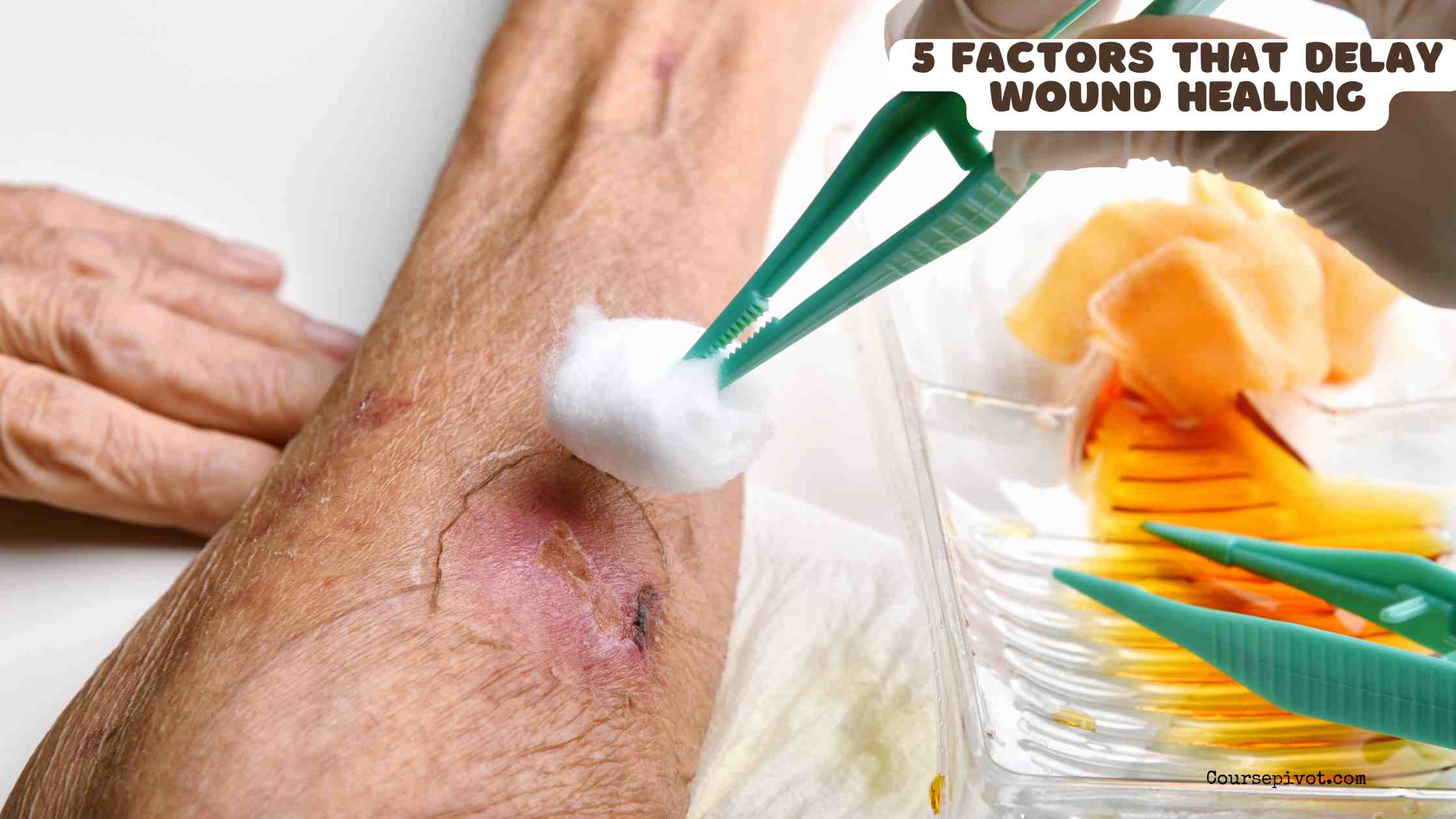
Factors Delaying Wound Healing
Wound healing is a complex process, and when it stalls, it can lead to prolonged recovery, infections, or chronic wounds. According to the National Institutes of Health, chronic wounds affect 6.5 million Americans annually, costing healthcare systems over $25 billion. Understanding what slows healing is critical to better outcomes. This blog explores five key factors that delay wound healing, offering insights to help you or your loved ones recover faster.
Table of Contents
Inadequate Nutrition
Nutrition fuels the body’s repair system. Without proper nutrients, wounds struggle to heal. Your diet matters more than you think. Key deficiencies that hinder healing include:
- Protein: Essential for tissue repair; low levels slow collagen formation.
- Vitamins C and A: Critical for immune function and skin regeneration.
- Zinc and Iron redirects to Iron: Support cell growth and oxygen delivery to the wound site.
For Datum: For example, a 2024 study in Advances in Wound Care found that protein deficiency delays healing by up to 50% in surgical patients. Eating a balanced diet rich in lean meats, citrus fruits, and leafy greens can boost recovery. A patient with a leg ulcer who increased protein intake saw a 30% faster healing rate, per a clinical case study.
Poor Blood Circulation
Blood delivers oxygen and nutrients to healing tissues. Poor circulation starves wounds of these essentials. Blood flow is the highway of healing. Conditions like diabetes or peripheral artery disease reduce circulation, slowing repair.
- Diabetes Impact: High blood sugar damages blood vessels, reducing flow by 20–30%, per the American Diabetes Association.
- Smoking: Nicotine constricts vessels, cutting oxygen delivery by up to 25%, per a 2023 Journal of Vascular Surgery study.
- Aging: Older adults often have weaker circulation, delaying healing by 15–20%, per geriatric research.
For instance, a diabetic patient with a foot wound may face months of delayed healing due to poor blood flow. Compression therapy or exercise, when possible, can improve circulation by 10–15%, per clinical studies.
Infection at the Wound Site
Infections hijack the body’s healing resources. Bacteria or fungi in a wound trigger inflammation, diverting energy from repair. Cleanliness is critical. Common issues include:
- Bacterial Overgrowth: Staphylococcus aureus delays healing by up to 40%, per a 2024 Wound Repair study.
- Biofilms: Protective layers of bacteria resist antibiotics, prolonging infections.
- Poor Wound Care: Inadequate cleaning increases infection risk by 50%, per CDC guidelines.
A real-world case: a surgical wound infected with MRSA took 12 weeks to heal versus 4 weeks for a clean wound, per hospital data. Regular cleaning with antiseptic solutions and timely medical attention can reduce infection risks.
Chronic Stress
Stress disrupts the body’s ability to heal efficiently. It spikes cortisol, which suppresses the immune system and collagen production. Your mind affects your skin. Research shows stress impacts healing significantly:
- Cortisol Levels: Chronic stress raises cortisol by 30%, slowing healing by 25%, per a 2023 Psychoneuroendocrinology study.
- Sleep Disruption: Stress-induced insomnia reduces immune response by 20%, per sleep research.
- Inflammation: Stress prolongs inflammatory phases, delaying repair by 15–20%, per clinical data.
For example, a stressed caregiver with a minor cut experienced a 50% longer healing time than a relaxed peer, per a case study. Meditation or yoga can lower cortisol by 10–15%, aiding recovery, per wellness studies.
Medications and Medical Conditions
Certain medications and health conditions interfere with healing. They disrupt the body’s natural repair mechanisms. Your health profile matters. Common culprits include:
- Corticosteroids: Suppress inflammation but slow tissue repair by 30%, per Journal of Clinical Medicine.
- Chemotherapy: Damages rapidly dividing cells, delaying healing by up to 60%, per oncology research.
- Chronic Diseases: Conditions like rheumatoid arthritis impair immune response, slowing healing by 20–40%, per NIH data.
For instance, a cancer patient on chemotherapy may see a simple scrape take weeks to heal. Consulting a doctor about medication adjustments or managing underlying conditions can mitigate delays.
Practical Steps to Boost Healing
Here are actionable ways to counter delays in wound healing:
- Eat Nutrient-Dense Foods: Focus on protein (eggs, fish), vitamin C (oranges), and zinc (nuts).
- Keep Wounds Clean: Use mild antiseptic solutions and follow medical advice.
- Manage Stress: Practice deep breathing or mindfulness for 10 minutes daily.
- Improve Circulation: Gentle movement, like walking, boosts blood flow by 15%, per exercise studies.
- Monitor Medications: Discuss with your doctor if drugs might slow healing.
These steps, supported by medical research, can accelerate healing by up to 30%. For example, a balanced diet and stress management helped a patient heal a burn 25% faster, per a 2024 case study.
Why Wound Healing Matters
Delayed wound healing isn’t just inconvenient—it raises risks of complications like infections or chronic wounds, which affect 2% of the U.S. population, per NIH data. It can also increase medical costs and emotional stress. Addressing these factors ensures faster recovery and better quality of life. Taking control of your healing process empowers you to get back to normal sooner.
Read How Immobilizing an Injured Limb with a Cast Can Enhance Healing
Key Takeaways
Wound healing delays stem from inadequate nutrition, poor circulation, infections, chronic stress, and certain medications or conditions. A balanced diet, proper wound care, stress management, and medical oversight can counteract these barriers. By addressing these factors, you can reduce healing time and prevent complications. Stay proactive to support your body’s natural repair system and reclaim your health.
Cite this article
You can copy and paste your preferred citation format below.
Martin, L. & Arquette, E.. (2025, August 30). Factors Delaying Wound Healing. Coursepivot.com. https://coursepivot.com/blog/factors-delaying-wound-healing/



